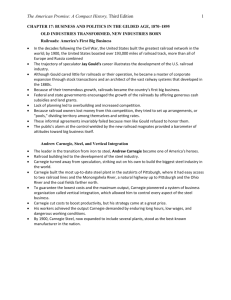Big Business in the Gilded Age DBQ US History Name: Guiding Question: From 1870 to 1900, corporations grew significantly in number, size, and influence in the United States. Analyze the impact of big business on the economy and politics and the lives of Americans. SSUSH11 The student will describe the growth of big business and technological innovations after Reconstruction. Railroads Railroads Railroads increased the amount of steel being used in two ways- 1. The railroads used steel for their rails. Railroads made it much easier to transport large quantities of the natural resources needed to.


Standard Oil, Refinery #1, 1899. |
During the late nineteenth century, large corporations that employed thousands of workers formed. These companies became known as Big Businesses.
Ssush11: Big Businessus History
Before the American Civil War, the United States was in its infancy when it came to industrialization. The vast majority of Americans earned their living in agriculture. The businesses that did exist usually were small operations. At most, these firms might be able to dominate local markets, but they played only a minimal role in the national economy.
Ssush11: Big Businesses History Pdf
Following the Civil War, Big Business emerged. Larger companies began to form. These firms strove to dominate the economic arena. They formed trusts, monopolies, and pools to limit competition from other companies. Business owners formed trusts, where one person or a group of people controlled several companies, to reduce production costs and to set prices. Companies attained a monopoly when they became the sole manufacturer or supplier of a product. Pools consisted of secret agreements between various businesses to eliminate competition. As these firms grew, they succeeded in driving out competition and dominating their respective economic sectors. For example, Ohio's Standard Oil Company held a virtual monopoly over oil production in the Eastern and middle sections of the United States.

Ssush11: Big Businesses History Answer
Generally, the owners of these firms benefited tremendously. They acquired massive amounts of wealth and commonly refused to share their profits with their workers. Workers struggled to make ends meet. They commonly earned less than a dollar for working twelve or more hours per day. In response to low pay and poor working conditions, workers organized national labor unions, including the Knights of Labor and the American Federation of Labor. In addition, social reformers established groups to assist the working class in coping with the industrialists. The federal government also intervened, enacting legislation, such as the Sherman Antitrust Act, to protect workers and to prohibit single companies from dominating the marketplace.
See Also
Ssush11: Big Businesses History Book

+by+developing+vertical+integration..jpg)